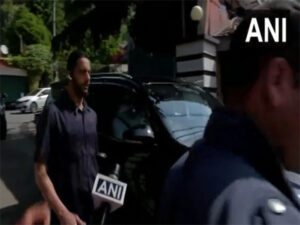PM Modi seeks support of women to make 3 crore ‘lakhpati didis’
Jammu, Feb 20 (PTI) Prime Minister Narendra Modi on Tuesday sought the support of the country’s women folk and said he wants to make three crore women in India “lakhpati didis”.
The prime minister lauded the beneficiaries of the Centre’s major schemes in Jammu and Kashmir for setting an example for the rest of the country. He interacted with the beneficiaries during his visit to Jammu to ascertain how the schemes have transformed the lives of the people in the Union Territory.
During a public rally, the PM encouraged a self-help group (SHG) head Kirti Sharma of Basohli area of Kathua district to leverage the loan scheme under Grameen Aajeevika scheme and contribute to the success of rural women.
Kirti, whose SHG had purchased three cows on a loan of Rs 1 lakh and repaid the loan, has a big cowshed now due to the efforts of several women.
She said, “The lives of women are changing and they are becoming the engines of change in rural India. The credit of the changes goes to such schemes gifted to us by the prime minister”.
Lauding Kirti for her contribution, the PM sought support from the country’s women folk and said he wants to make three crore women in India “lakhpati didis”.
“You have brought a revolution. I have a big dream for sisters like you who work in self-help groups. Among them, I want to make three crore women lakhpati didis. Can you help me with this?” the prime minister asked Kirti.
She replied saying she will fully support Modi’s mission of “lakhpati didis”.
“There are 5,871 women in groups in the district. I will help them become ‘lakhpati didis’ in order to help you,” she said.
Narrating her story, Kirti said that her group is named as Ayaan.
“I had no employment before joining a self-help group. I had no identity of my own. By joining the group, I got an opportunity to depend on self. I was successful in empowering other women. I took a loan of Rs 30,000 and purchased one cow. It has boosted my economy. We took three cows,” she said.
She further said her endeavour is to make women of these groups in the district self-dependent and empowered.
From farmers to SHG members, Modi interacted with five beneficiaries – including three from Jammu and two from Kashmir – to learn about the impact of schemes such as Pradhan Mantri Awas Yojana-Gramin (PMAY-G), PM Kisan, Jal Jeevan Mission, National Rural Livelihood Mission, Pradhan Mantri Jan Arogya Yojana (PMJAY), Ayushman Bharat, PM Ujjwala and Pradhan Mantri Kisan Urja Suraksha evam Utthaan Mahabhiyan (PM-KUSUM) on their lives.
The prime minister acknowledged the exemplary role played by Shaheen Begum, a post-graduate entrepreneur from north Kashmir’s Bandipora area.
Shaheen, a beneficiary of the Deendayal Antyodaya scheme, has transformed the lives of rural women in Kashmir by setting up SHGs and various units, including a poultry farm.
She credited the prime minister for her success, stating, “Your schemes have changed our lives. I never dreamt that such a change would take place. It was a difficult life for us but you changed it. We thank you, Sir.”
PM Modi praised Shaheen for her entrepreneurship skills and also commended her parents for educating her.
He said, “I bow before your parents for educating you. You are becoming a successful entrepreneur. That shows everything is possible under the Modi rule,” he said.
Continuing the engagement, he greeted Lal Mohammad, a Gujjar from Poonch district, who has successfully constructed a house under the Pradhan Mantri Awas Yojana-Gramin (PMAY-G).
Mohammad recited a poem in praise of Modi and India, expressing his support to them.
The prime minister extended greetings to Riyaz Ahmed Kohli from Pulwama and Veena Parihar from Atholi (Paddar) in Kishtwar district, the first time beneficiaries of the Jal Jeevan Mission and PM Ujjwala schemes which gave them piped water supply and gas connection respectively, in the remotest areas of J&K.
Kohli shared his story about the manner in which his remote village got connected through piped water under Jal Jeevan Mission to provide water supply to their village.
“We have got water connections for the first time since Independence. We got benefited from the forest rights law after the abrogation of Article 370. We thank you, Sir. I never thought about talking to the PM like this. We are fortunate to talk to you,” he said.






